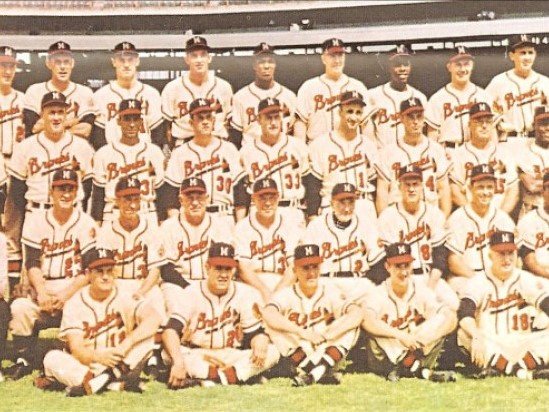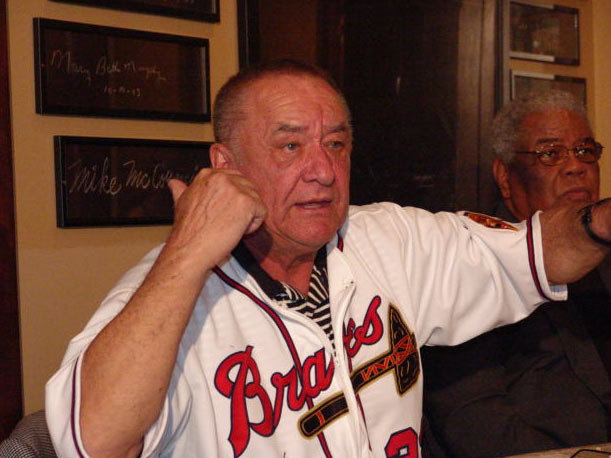Optimism reigned for good reason as the Milwaukee Braves headed to spring training in Florida in 1957 and the Brewers to Arizona in 1982.
Both teams looked poised to do great things. The Braves had gone down to the last weekend in 1956 before losing the National League pennant to Brooklyn.
Milwaukee went to St. Louis for the last series of the '56 season with a one-game lead over the Dodgers. But, when Brooklyn swept two games from the Pirates and the Braves lost the first game against the Cardinals, the Braves faced a must-win situation.
Warren Spahn took the mound and pitched well until the bottom of the 12th inning, when Rip Repulski's shot careened off Eddie Mathews' knee at third base and knocked in Stan Musial for a 2-1 St. Louis victory that killed the Braves' pennant hopes.
"It was a long winter," Mathews recalled in Bob Buege's excellent book, "Eddie Mathews and the National Pastime." "When you come close to winning a pennant and don't win it, everybody wants to ask you why you didn't win, or how it feels to get so close but lose...Spring was different."
The Braves made some changes during the off-season to strengthen the team. In February, they sold second baseman Jack Dittmer to Detroit. During spring training, they acquired infielder Dick Cole for Jim Pendleton and later acquired catcher Carl Sawatski and pitcher Juan Pizarro.
Their nucleus still included Mathews, Henry Aaron, Billy Bruton, Joe Adcock and the Big Three in the pitching rotation - Warren Spahn, Lew Burdette and Bob Buhl.
So, as the Braves reported to camp in Bradenton, they were expected to once again battle it out with the Bums from Brooklyn for the NL pennant. Manager Fred Haney wanted to make sure they were ready.
"If anything good came out of blowing the pennant in 1956, it was 1957," Aaron recalled in the book, "I Had A Hammer." "We didn't want it to happen again, and Fred Haney intended to make sure it didn't. Haney seemed to think that all we needed was some toughening up, so when we reported to Bradenton, it was boot camp.
"We ran sprints and did push-ups and sit-ups - things that athletes so when they're in training. It was sort of a new concept for baseball, and to us it made Haney seem more like a drill sergeant than a field manager. We called him Little Napoleon."
Their route to that pennant would take a much different path than expected in February. Bruton would go down with a season-ending injury, and Adcock and Burdette would be hampered by injuries.
But, players like Frank Torre, Nippy Jones, Bob "Hurricane" Hazle and Red Schoendienst, who was acquired in a midseason trade, filled in well and kept the Braves in the race. More will be documented on their contributions later in this series of stories.
Split-season Winners
The Brewers also were poised for big things when they headed to spring training in 1982.
They had won the second-half pennant in a 1981 season that was interrupted by a 56-day strike.
Rollie Fingers had carried the Brewers in the second half of the '81 season. Of the 31 victories the Brewers had after the strike ended, Fingers saved 16 and won five, posting an ERA of 0.72.
Fingers was involved in 12 of the last 15 victories, and fanned Lou Whitaker to secure a 2-1 triumph on Oct. 3 and wrap up the second half title. The performance won Fingers the Cy Young Award and MVP and vaulted the Brewers into a playoff with the Yankees, who had won the first half title.
They lost that playoff series to the Yankees, but looked poised to be a contender again in 1982 with Buck Rodgers, who had taken over in 1981 for the ailing George Bamberger, at the helm.
Under Rodgers, however, the Brewers got off to a 23-24 start and were seven games out of first place in June. GM Harry Dalton then made the tough decision to fire Rodgers and install hitting coach Harvey Kuenn as manager.
"We were close to 50 games into the season and by that time the club wasn't responding the way it should," Dalton recalled years after the decision. "I felt Buck didn't have a handle on it at that time. I felt Harvey knew them all, they liked him and respected him. He lifted a blanket off the club."
More will be detailed on this big move and the '82 season in future stories. Suffice it to say that both the 1957 Braves and 1982 Brewers went to spring training expecting big things. But, only adjustments once the seasons started allowed them to actually accomplish those things.







